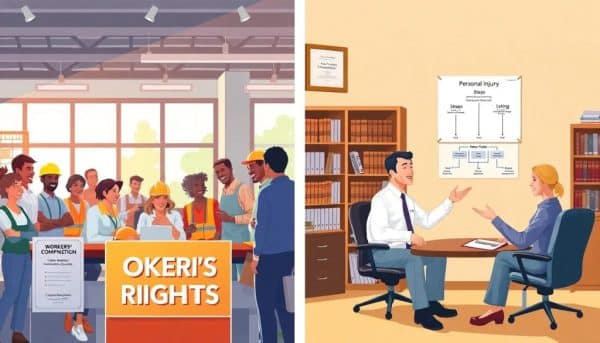Understanding the difference between workers’ compensation and personal injury lawsuits is crucial for anyone navigating injuries sustained at work or due to someone else's negligence. Both systems serve as a means of compensation, but they operate under vastly different rules and circumstances.
This article explores the nuances between these two legal avenues, helping you determine which option may be best suited for your situation.
What is workers’ compensation and how does it work?
Workers' compensation is a form of insurance mandated by law that provides wage replacement and medical benefits to employees injured in the course of employment. It acts as a no-fault system, meaning employees can receive benefits without needing to prove employer negligence.
The primary intention of workers’ compensation is to provide swift financial relief to injured workers, covering:
- Medical expenses
- Temporary or permanent disability payments
- Vocational rehabilitation
Employees usually must report their injuries to their employers within a specific timeframe to qualify for benefits. The process can vary by state, but most jurisdictions require an employer to carry workers' compensation insurance.
What are personal injury claims and their key features?
Personal injury claims arise when an individual suffers harm due to someone else's negligence or wrongful acts. Unlike workers' compensation, personal injury cases typically require the injured party to prove that the other party was at fault.
Key features of personal injury claims include:
- The requirement to establish fault or negligence
- Potentially higher compensation amounts that may cover pain and suffering
- The possibility of pursuing punitive damages
Common types of personal injury claims include car accidents, slip and fall incidents, and medical malpractice. Due to the complexity of proving negligence, enlisting a knowledgeable attorney is often advisable for those pursuing such claims.
How do workers’ compensation and personal injury claims differ?
The workers’ compensation vs. personal injury lawsuits debate hinges on several critical differences. Firstly, workers' compensation is a no-fault system, while personal injury claims require proof of fault. This fundamental distinction affects eligibility and the nature of the claims.
Other notable differences include:
- Coverage: Workers' compensation generally covers medical expenses and lost wages, whereas personal injury claims can include additional damages for pain and suffering.
- Legal Process: Workers' compensation claims are often handled administratively, while personal injury lawsuits may necessitate going to court.
- Time Limits: Each claim type has its own statute of limitations; workers’ comp claims may have shorter deadlines than personal injury lawsuits, which can vary by state.
Understanding these distinctions is essential for making informed decisions about the best course of action following an injury.
Can you file workers' compensation and personal injury claims simultaneously?
In certain situations, it is possible to file both workers’ compensation and personal injury claims. For example, if you were injured at work due to a third party's negligence—like a vendor or subcontractor—you might be able to pursue a personal injury claim against that party while also seeking benefits through your employer’s workers' compensation insurance.
Filing both claims can sometimes complicate matters, particularly concerning the compensation amounts awarded. Workers' compensation benefits could be reduced if you receive additional funds from a personal injury settlement.
Consulting with a legal expert is advisable to navigate these complexities effectively and ensure that you maximize your potential recovery.
What factors should you consider when choosing between workers’ compensation and personal injury?
Several important factors come into play when deciding between workers’ compensation and personal injury claims:
- Nature of the Injury: If your injury occurred at work and was not due to a third party’s negligence, workers' compensation is often your best bet.
- Proof of Negligence: If you have strong evidence that another party’s negligence caused your injury, you may be better off pursuing a personal injury claim.
- Potential Compensation: Consider the potential compensation available through each avenue. Personal injury claims often provide broader compensation.
Taking time to evaluate these factors can significantly impact your recovery and the financial security you seek following an injury.
How can an attorney help you navigate your case?
Engaging an attorney can be invaluable when dealing with either workers’ compensation or personal injury claims. A knowledgeable lawyer can help you understand your rights, gather necessary documentation, and navigate the complexities of the legal system.
Some specific ways an attorney can assist include:
- Advising you on whether to file a workers' compensation or personal injury claim.
- Helping you gather evidence to support your case.
- Representing you in negotiations or court as necessary.
Choosing the right legal representation can make a significant difference in the outcome of your case. Look for attorneys who specialize in your specific type of claim and have a proven track record.
Related Questions About Compensation and Injury Claims
Is workers' comp the same as personal injury?
No, workers' compensation and personal injury claims are not the same. Workers' compensation is an insurance program providing benefits regardless of fault, while personal injury claims require proving someone else's negligence to receive compensation.
What is the difference between workers comp and PI?
The primary difference lies in the requirements for compensation. Workers' comp is based on a no-fault system covering medical expenses and lost wages, whereas personal injury (PI) claims focus on fault and can include damages for pain and suffering and other losses.
What are the odds of winning a personal injury lawsuit?
The odds of winning a personal injury lawsuit depend on various factors, including the strength of your case, the evidence presented, and the specific laws in your jurisdiction. Having a skilled attorney can significantly improve your chances of a favorable outcome.
What is the hardest injury to prove?
Injuries that lack visible physical damage can be particularly challenging to prove, such as chronic pain conditions or psychological injuries. These types of injuries often require extensive documentation and expert testimony to substantiate claims.

